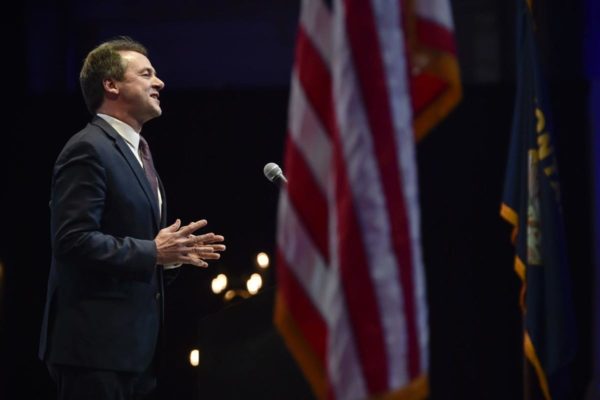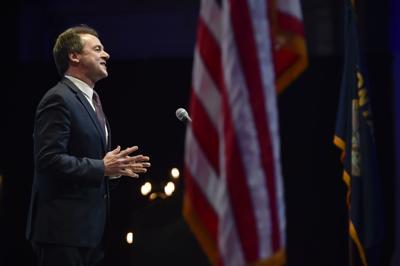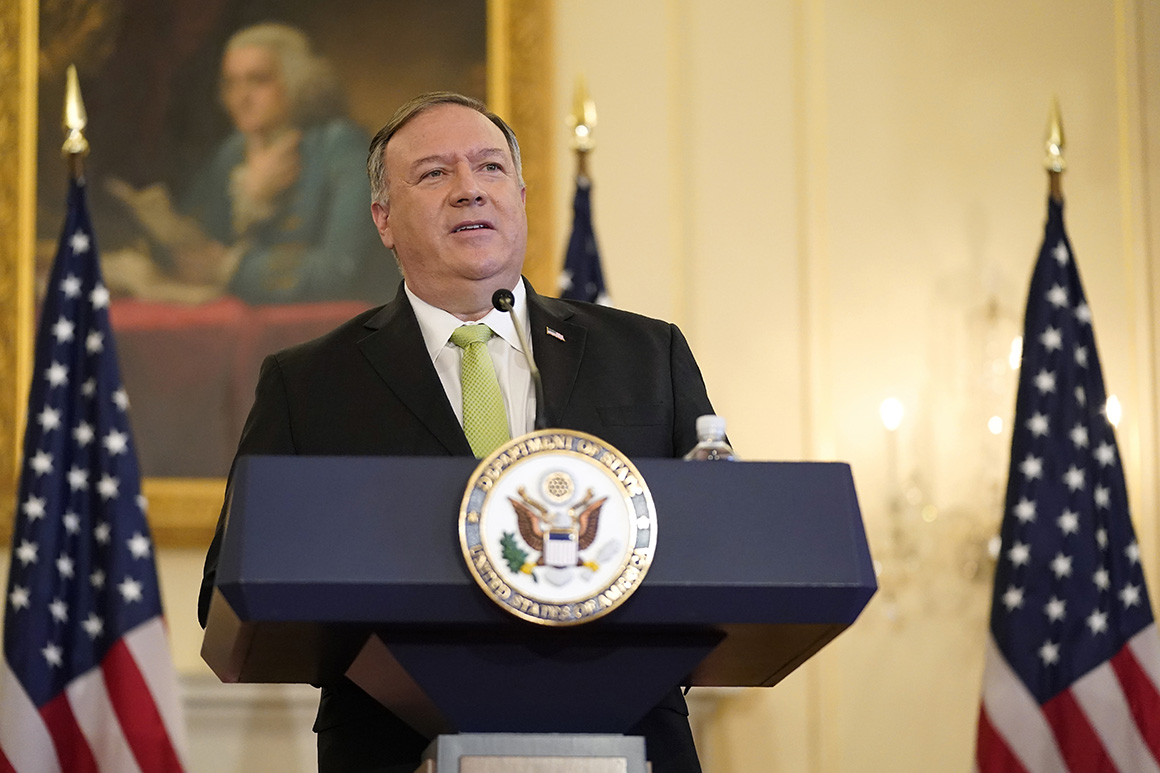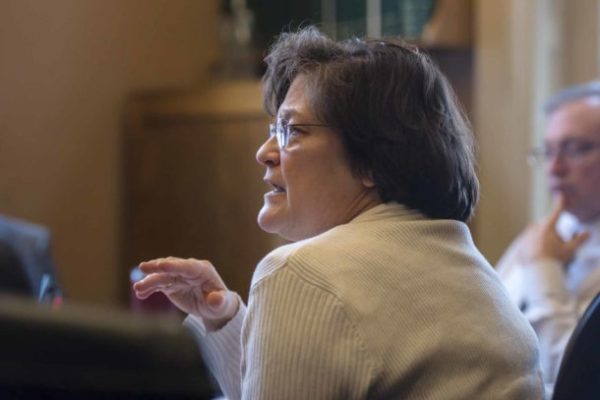It’s official: Bullock running for Senate

Gov. Steve Bullock speaks at the annual Mansfield Metcalf Dinner on Feb. 29 at the Lewis and Clark County Fairgrounds in Helena. Bullock on Monday will file to run for U.S. Senate.
THOM BRIDGE, Independent Record
Democratic Montana Gov. Steve Bullock on Monday will do what for months he proclaimed he wouldn’t — enter the U.S. Senate race, saying he wants to bring a Montana attitude to Congress and that he made the choice after encouragement from people around the state and getting the backing of his family.
“I do wish D.C. worked more like Montana and decided to do this in part from people I’ve heard from,” Bullock said. “Also we as a family recently had a discussion and decided ‘You can either wish it worked like Montana or try to do something about it.’ We decided it isn’t the time to be on the sidelines.”
Bullock is a two-term governor who ran in what was then a crowded Democratic field seeking the presidential nomination for eight months before dropping out in December. Termed out from running to keep his current job, Bullock insisted before and after his presidential race that he wouldn’t consider the Senate.
That repeated insistence didn’t deter Montanans, many of whom took to social media with frequency and vehemence urging Bullock to challenge incumbent Republican U.S. Sen. Steve Daines, who is seeking his second term.
“For months and months, I’ve heard from Montanans literally just about every day,” Bullock said in an interview Sunday. “My wife’s heard from them, my kids have heard from them in school.”
Bullock will file for office Monday and released that morning a video announcing his Senate bid, highlighting his administration’s accomplishments in office including freezing college tuition for the majority of his time as governor, advancing apprenticeship programs, passing and continuing Medicaid expansion, working to shine a light on dark money in state politics and more.
This entrance into the Senate contest comes at the last minute, as the deadline to get on the ballot in Montana is Monday. Five Democrats had already filed to run; one dropped out last week after news outlets reported Bullock’s possible change of heart.
Daines does have a primary challenger, Stevensville hardware store owner Daniel Larson, though the incumbent is still the heavy favorite in the GOP primary.
After eight years as governor and four as attorney general before that, Bullock has a level of popularity in the state and name recognition that means although he joined late, he’s still the presumptive favorite on the Democratic side.
The other Democrats running are Bozeman resident Cora Neumann, who has worked in the public lands and public health fields; Helena Mayor Wilmot Collins; John Mues, a Navy veteran and engineer who works in the energy field and lives in Loma; and scientist Mike Knoles, of Bozeman. Josh Seckinger, a fly-fishing guide who also lives in Bozeman, ended his bid late Thursday after 16 days as a candidate and said he would support Bullock.
Bullock faced pressure to run for Senate from no less than former President Barack Obama, with whom he met in Washington, D.C., last month, and Senate Minority Leader Chuck Schumer, who flew to Montana at the end of February. But those voices compelled him less than discussions with his family, who in the end urged him to run, and Montanans, Bullock said.
“I honestly thought that our state was at a crossroad and this place that we call home could really change,” Bullock said. “I’ve worked over the last seven years to try to represent all of our state, and working with Democrats and Republicans I think that we’ve been able to get good stuff done. … It is not an exaggeration that I hear from Montanans every single day and have for months and months.”
Still, the Montana Republican Party has already capitalized on those meetings as forces swaying Bullock, releasing last week an online video pointing out many of the times the governor said he wouldn’t run for Senate and that the change of heart came after the Obama and Schumer meetings.
Montana Republican Party Chairman Don Kaltschmidt released a statement Wednesday criticizing what was then a possible Bullock run.
“Gov. Bullock isn’t actually interested nor would he find it compelling or enjoy being a U.S. senator — he said so himself, he simply couldn’t resist the pressure from Barack Obama and Chuck Schumer,” Kaltschmidt said in the statement.
Bullock pointed to another D.C. lawmaker as a bigger motivator that Schumer or Obama.
“As far as from outside influences, (Senate Majority Leader) Mitch McConnell probably served as more of a motivation to me than Chuck Schumer or anybody else,” Bullock said, adding that he was not offered any sort of cabinet position in a possible Democratic administration or any other enticement that led him to run. “ … We have to get the Senate working. I would like to see a guy who does everything possible to keep that from happening no longer be the leader.”
While previously saying his experience as an executive in state government better suited him to be president instead of a senator, Bullock said Sunday his ability to work and negotiate with state lawmakers to pass key Democratic initiatives through a Republican-dominated state Legislature is a strong resume to bring to a Senate campaign.
“All the 12 years that I’ve served in office, I’ve served in the executive branch where what I’ve tried to do is say, ‘Let’s not just talk about things, let’s get them done,’” Bullock said.
This November Democrats are eager to flip the the U.S. Senate, where Republicans hold a 53-47 majority. Bullock has long been seen as the party’s best chance to win back Montana’s seat, which the Cook Political Report has been ranking as a solid one for the GOP to hold.
Changing the Senate math would open legislative roads that were previously blocked, Bullock said.
“I do think by and large the U.S. Senate is a place that doesn’t get things done,” he said, adding that even if Democrats do not win back the majority, he would work to find common ground and move beyond partisanship if elected.
“I think that how I would approach the job is pretty reflective of how I’ve approached the job as governor over the last seven years, trying to bring people together to get things done,” Bullock said.
Asked if there were moments in the last year where he found actions in the Senate concerning enough that they swayed him to join the race, Bullock said he’s more frustrated with a lack of action.
“The better question is where have we actually seen the Senate work recently,” Bullock said. “I’m hard-pressed to find those examples.”
In interviews with newspaper editorial boards around the state in January, Bullock was critical of Daines generally but didn’t get into the specifics of where he thinks the Republican senator comes up short. On Sunday he said he would expand on that as his campaign rolls out.
“I wouldn’t be doing this if I thought Sen. Daines was really getting the job done and representing and working on behalf of all Montanans,” Bullock said.
Daines has worked to tie himself to President Donald Trump, being both a vocal supporter and defender of the administration. Last week after news of Bullock’s likely entrance to the race broke, Trump tweeted his support of the Republican senator, writing: “The great people of Montana can have no better VOICE than Senator @SteveDaines. He is doing an incredible job! Whoever the Democrat nominee may be, please understand that I will be working hard with Steve all the way, & last night I was 20 for 20 (per @GOPLeader). WE NEED STEVE!”
Trump came to Montana four times in 2018, holding large rallies in an effort to try to defeat Democratic incumbent U.S. Sen. Jon Tester, who won re-election that year against Republican state Auditor Matt Rosendale. Bullock said Sunday he’s undeterred by possible return visits from the president this year.
“There’s a reason why when Trump took Montana by 20 points, in the most expensive governor’s race in our state’s history, I won by 4 (points),” Bullock said.
The final decision to run for Senate came over the last few days. Calling this an “all-hands-on-deck moment,” Bullock said he and his family have talked about ways to balance being in the Senate, if he’s elected, with getting home for things like basketball games. While his oldest daughter starts college in the fall, it will be about four and a half years until his younger two children are out of the home.
There are about nine months left in Bullock’s final term as governor, and he said Sunday he can mount an effective Senate campaign while serving out the end of his time as governor.
“I would hope people have seen that I have been pretty good at trying to balance all the competing demands and still remain governor of the state of Montana and do the same,” Bullock said, pointing to things such as work from his Montana Climate Solutions Council as a way of illustrating accomplishing initiatives while running for president in 2019.
Bullock’s entry into the race quickly changes the landscape not only for the U.S. Senate contest, but also for down-ballot races.
While Daines was expected to fare well against the Democrats who previously announced for Senate, Bullock will present more of a challenge. Still, Daines has a $5 million war chest compared to the roughly $122,000 left in Bullock’s presidential account. Political analysts do point out Bullock should be able to quickly tap into fundraising networks.
A more competitive U.S. Senate race will also bring massive amounts of outside spending to Montana, along with get-out-the-vote efforts and energy that could excite Democrats in a year when Trump is again expected to dominate the top of the ticket.
Montana’s lone U.S. House seat is also up for election this year, as is the governor’s office and all the other elected statewide offices. That’s in addition to 125 seats in the state Legislature, positions on the state Supreme Court, Public Service Commission and more.
Additionally, Green Party candidate Wendie Fredrickson and Libertarian Eric Fulton have filed to run for U.S. Senate. The Secretary of State qualified the Green Party to appear on the ballot last Friday. It’s still unclear who was behind the effort to gather enough signatures to qualify the party. Conservative political action committee Club For Growth Action is the only group to have registered to do that work in Montana, but told Lee Newspapers and the state Commissioner of Political Practices it would not submit signatures.
Third-party candidates can draw votes from the major parties, with the Green Party seen as siphoning votes from Democrats while Libertarians, who are qualified to appear on the ballot already, taking votes that might otherwise go to Republicans.











